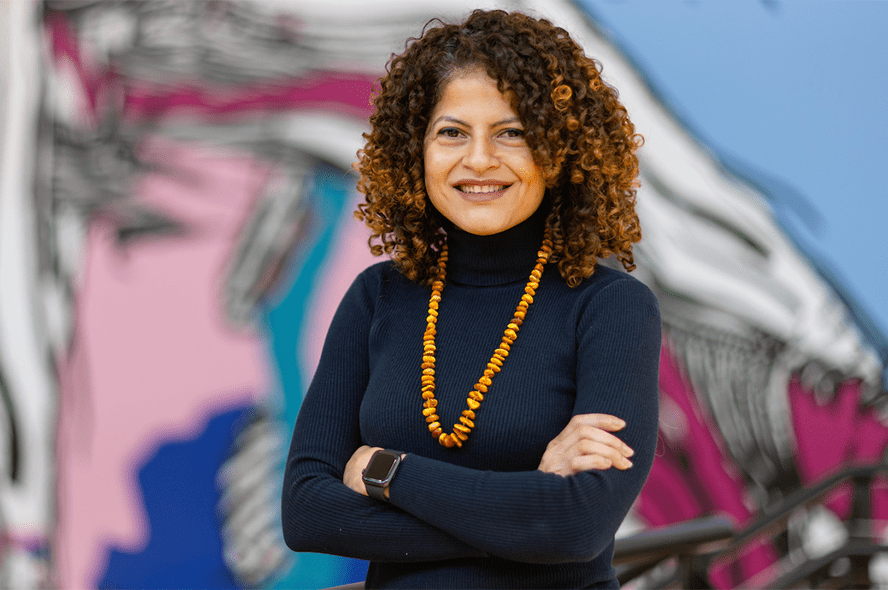Pérez receives NSF CAREER Award

Greses Pérez, McDonnell Family Assistant Professor in the Department of Civil and Environmental Engineering at Tufts University, has received a CAREER Award from the U.S. National Science Foundation (NSF). The NSF’s Faculty Early Career Development (CAREER) Program is among the most prestigious national awards for early-career faculty who have the potential to lead advances in research and serve as academic role models.
Students draw upon their life experiences and the values of their communities as they learn. However, the process of developing connections between these personal experiences and cultivating engineering competencies remains severely under-researched, especially concerning the unique realities of historically marginalized groups in STEM disciplines. Pérez underscores this issue, noting, “Black-Latinx/é communities have been engaging in innovation and technology development for generations. However, learners from these communities are often rendered invisible, overlooked, and rarely the center of engineering practice and research.”
Through the research proposal funded by NSF, Pérez aims to develop a theoretical model of the connections between Black-Latinx cultural and language practices and engineering practices. Additionally, this project will pioneer a community-led pedagogical framework to create inclusive engineering learning environments, which will support our understanding of the distinct features that facilitate the integration and connection of historically marginalized groups in engineering classrooms. These learning environments will empower students to bring their whole selves to engineering. The resulting theoretical model will reshape prevailing conceptions of engineering from a socially-detached activity to a community-led endeavor. This shift emphasizes the importance of representation and incorporates the diverse ways of speaking and cultural understandings of underrepresented groups in engineering.
With three undergraduate engineering courses delivered across institutional locations in Massachusetts, Florida, and Texas, the project will incorporate the perspectives of students from all racial and ethnic backgrounds, with a specific emphasis on Black-Latinx/é learners. These three community-led courses will provide students with a unique opportunity to engage in engineering thinking and doing, all within a framework that draws inspiration from real-world examples rooted in the histories, traditions, and experiences of Black-Latinx/é communities. The conceptual framework and pedagogical approach are envisioned as models for engineering programs across the country to center the resources and narratives of minoritized communities in engineering.
Due to the under-valuing of perspectives from outside the dominant discourses in engineering environments, students from underrepresented groups often feel tremendous pressure to assimilate – for example, to speak English at all times even while working with others who share their language background. Failure to embrace learners’ lived experiences can result in missed opportunities in engineering education and in engineering design solutions, which in turn leads to negative consequences for overlooked groups and for society as a whole. Pérez’s work seeks to incorporate the experiences of underrepresented communities into engineering education, and to expand our understanding of what engineering is and who engineers are.
At Tufts, Pérez leads a multidisciplinary research team that investigates the relationship between engineering and the language and cultural practices of communities. This effort extends to the development of innovative learning environments and learning tools designed to forge connections between engineering and people. In collaboration with the National Renewable Energy Laboratory (NREL) and K-12 schools, her team develops community engagement and learning approaches geared towards the energy transition and for addressing larger societal challenges such as climate change. Her team also investigates the design of linguistically diverse learning environments, spanning from hyper-localized games to inclusive engineering learning experiences, in partnership with students and educators in Dorchester, East Boston and at Tufts University.
In addition to her primary appointment in the Department of Civil and Environmental Engineering, Pérez holds secondary appointments in the Departments of Education and Mechanical Engineering. She is a faculty member at the Tufts Center for Engineering Education and Outreach (CEEO) and is a member of the steering committee for the Tufts Institute for Research on Learning and Instruction (IRLI).
Learn more about Pérez’s research.
The content of this article is solely the responsibility of the authors and does not necessarily represent the official views of the National Science Foundation. Research reported in this article was supported by the National Science Foundation under award number 2239348.